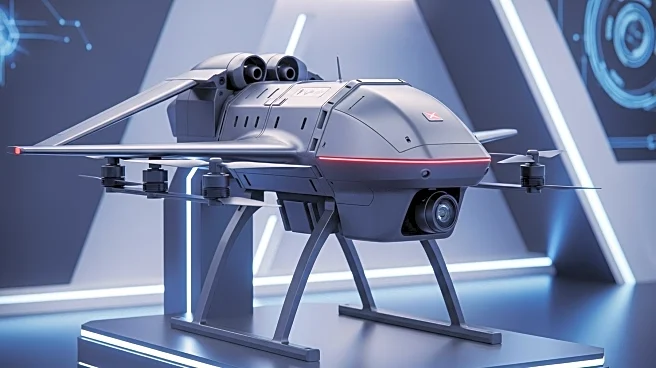What's Happening?
TEKEVER, a Portuguese supplier of dual-use security systems, has introduced its upgraded AR3 EVO uncrewed aerial system (UAS) at the DSEI 2025 event. The new platform offers significant improvements over the existing AR3 model, including a 50% increase in payload capacity, enhanced fuel efficiency, reduced weight, and lower radar and acoustic signatures. The AR3 EVO can operate for 20 hours in fixed-wing mode and 16 hours in vertical take-off and landing (VTOL) mode. The system's modular design allows for reconfiguration to meet various mission requirements, such as VTOL or fixed-wing operations, and different propulsion systems. TEKEVER's CEO, Ricardo Mendes, emphasized the importance of modularity in defense systems, allowing users to adapt the platform for diverse missions without needing multiple systems.
Why It's Important?
The introduction of the AR3 EVO UAS represents a significant advancement in military technology, offering enhanced flexibility and efficiency for defense operations. The modular design allows military users to adapt the system to various mission requirements, reducing the need for multiple specialized systems. This approach can lead to cost savings and operational efficiency, particularly in high-intensity warfare environments. The system's improved capabilities, such as increased payload and fuel efficiency, can enhance the effectiveness of military operations, providing strategic advantages in defense scenarios. The development aligns with broader trends in European rearmament and the need for sustainable military resources in response to geopolitical threats.
What's Next?
TEKEVER's focus on modularity may influence future defense procurement strategies, encouraging other manufacturers to adopt similar design philosophies. The company aims to continue producing hundreds of systems annually, maintaining agility in production to meet evolving defense needs. As European nations prioritize defense capabilities, TEKEVER's modular approach could become a model for scalable and adaptable military technology. The ongoing development of the AR3 EVO and similar systems may lead to increased collaboration between defense industries and governments, fostering innovation and resilience in military production.
Beyond the Headlines
The shift towards modular defense systems reflects a broader cultural change in military technology development, emphasizing flexibility and adaptability. This approach requires a transformation in engineering and production processes, challenging traditional methods focused on volume and cost. The success of TEKEVER's modular design could inspire similar innovations across other sectors, promoting a more agile and responsive approach to technology development. The emphasis on modularity also highlights the importance of user-centric design in defense systems, ensuring that military technology meets diverse and evolving operational needs.










